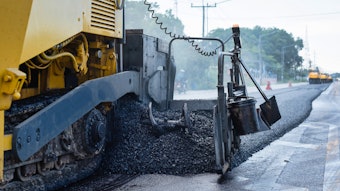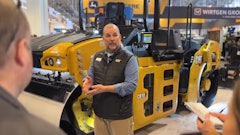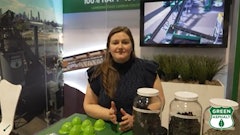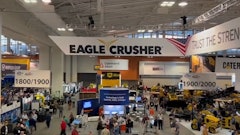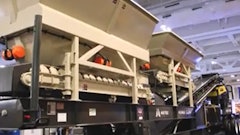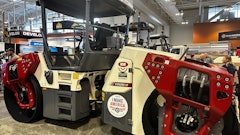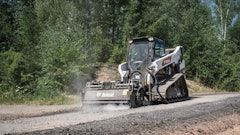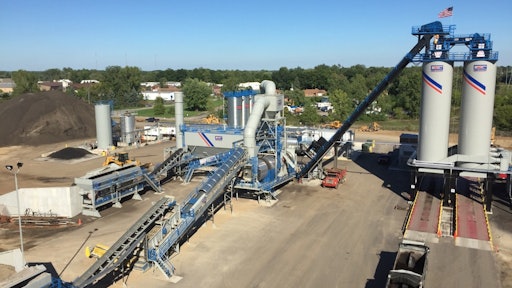
Ace-Saginaw Paving Company’s primary goal is to provide a high quality product and service and remain competitive in the markets it serves. To meet that goal, the company recently installed a new plant in Burton, MI.
Increased demand was the number one factor for building the new facility, says David Gohn, Michigan Asphalt Plant Manager with Ace-Saginaw.
“We had to meet our customer’s needs,” says Gohn. “Many days we were over-booked, and our customers were waiting.”
Gohn says there was also economic growth happening in the Flint, MI, area and a recently passed tax that was increasing demand. “Michigan passed an infrastructure tax, and we anticipate a greater demand of our products and services because of it,” he says.
Some background
From asphalt, aggregates, and agricultural products to cement, slag, and steel mill services, the Edw. C. Levy Co. covers it all, and is today a company with global reach. Its beginning was much more humble, however.
In 1918, Edward C. Levy started his company as a trucking contractor in the Detroit, MI, area. In the 1920s, he began crushing slag and introducing it to the market as a road base material. In the 1930s, he built a crushing and calcium chloride mixing plant to make road base material.
It wasn’t until the 1960s, that Levy tipped his toe into the asphalt market by purchasing three asphalt plants from Cadillac Asphalt Paving Co. to form Asphalt Products Co.
As the company continued its growth in the slag, aggregate and cement production industries, its asphalt arm expanded again the 1980s with the purchase of Ace Asphalt & Paving in Flint, MI.
While the company’s presence in the United States asphalt industry began in southeastern Michigan, it expanded again in the 1980s, this time into Colorado to cater to the needs of customers in the western portion of the U.S. with the addition of Schmidt Construction Co. in Colorado Springs.
In early 2000, Levy Purchased Saginaw Asphalt and Saginaw Valley Asphalt along with one plant in Port Huron from the Iafrate Company. The acquisitions allowed the Levy Company to expand its market throughout Eastern Central Michigan, consolidating operations after the purchases allowed it to streamline operation cost.
Collectively, these companies provide upwards of five million tons of hot and warm mix asphalt each year for its own construction crews and for customers in the paving, construction, and commercial industries.
Recently, the Levy group of companies consolidated two of its long standing Michigan asphalt divisions. The former companies, Ace Asphalt Paving Company and Saginaw Asphalt Paving Company, combined to form Ace-Saginaw Paving Company.
It’s all in the mix
Ace-Saginaw Paving Company provides the Eastern Central Michigan region with asphalt services and products that range from asphalt production, asphalt paving and construction. The company also offers engineering and design for the private sector as needed.
Ace-Saginaw produces several types of high quality asphalt mixes and pavements with an array of quarried and slag aggregates and recycled materials.
“Our sister company, Lyon Sand & Gravel, crushes all of the recycled materials,” says Gohn. “Our average RAP percentage at the new Burton plant is 35%.”
Ace-Saginaw mix arsenal includes warm mix asphalt (WMA), ultra-thin, crumb rubber, latex, polymers, stone matrix asphalt (SMA), commercial and DOT mixes. The company also offers many commercial mixes with recycled materials as well.
There are five locations in Michigan: Davisburg (600-tph plant), Burton (500-tph plant), Port Huron (500-tph plant), Saginaw (500-tph plant) and Ubly (300-tph plant).
Today, Ace-Saginaw produces about 1.1 to 1.4 million tons of asphalt annually and is anticipating increased production with the new state funding.
New Burton installation
In 1996, Ace-Saginaw installed components to convert a batch plant to a 400-tph dual drum system conversion plant, says Gohn.
“In 2015, we dismantled the old plant and changed the elevation, installed better drainage on the entire property, met or exceeded environmental requirements within the design of the new plant, and installed a Gencor Ultraplant 500-tph capacity system,” he explains.
The new plant includes:
- Advanced Rap Entry (A.R.E.) System
- Ultra II dual fuel burner
- Two RAP bins
- Eight aggregate bins
- Four 300-ton silos; two on each truck scale with the ability to add an additional scale per silo
- Two Rice Lake 140-ft. truck scales
- Three 30,000-gal. vertical AC tanks
- ULTRALOGIKS Plant controls and building
- Self-contained MCC building
“We chose Gencor because we have existing Gencor plants in operation,” says Gohn. “They have a personal commitment to stand behind their product, and I believe their equipment design helps us provide a quality product.”
Gohn says the A.R.E. system with two RAP collars also allows more retention time to increase the percentage of RAP they can use when allowed.
According to Gencor, the A.R.E. concept uses the gases and convective heat of the combustion zone to preheat and advance the release of internal moisture in the recycle pavement. This advanced release of moisture results in higher higher RAP production of 50% due to a more even and staged release of water vapor in the drying process.
The material process flow starts at the virgin aggregate feed end of the Ultradrum where aggregates are quickly heated to temperature as they approach the burner. While the aggregates approach the combustion zone, the recycled asphalt (having previously been reduced in size) is introduced in the combustion zone, behind the specially designed combustion flighting.
This special flighting allows the RAP material to cascade around the combustion zone and absorb conductive and convective energy. The heat from this action releases internal moisture before it enters the mixer. RAP, virgin aggregate and baghouse dust combine in the mixing zone, away from the direct radiant zone. Asphalt cement (AC) is then added into a thoroughly dried mixture of primary dust, virgin aggregate and RAP to form a fully coated and homogenous mix before exiting the drum.
Any hydrocarbons or steam vapors generated from the mixing process are captured by Gencor's patented Volatile Reclaim System and returned to the burner as fuel.
Other efficiencies the plant offers include VFD drives on all main components of the plant and the Ultralogiks Plant Control System which manages and monitors all plant control functions in a Windows-based environment and graphical user interface. The hardware is an advanced PLC control platform that performs all the plant operations including both blending and loadout functions. A backup computer and redundant hard drive assure the operator of complete security of the data and operating system.
“Safety was a top priority when choosing the plant components and layout,” says Gohn. “We sat down with Gencor to emphasize and implement the use of stairs versus ladders, electric chain hoists on silos, extra guards and access doors to meet our requests.”
Culture of continuous improvement
The new plant installation in Burton fits neatly into Ace-Saginaw’s, and its parent company’s, sustainability goals.
The Levy Group of Companies is deeply committed to protecting the natural environment, and it is constantly searching for opportunities to reduce waste, minimize CO2 emissions, and to conserve and reuse energy wherever and whenever possible.
“We are dedicated to building sustainability into our products – from foundations for windmills and solar farms to recyclable glass, permeable asphalt pavement mixes, and many other environmentally conscious products and services,” says Gohn.
“For us, providing effective and continuous solutions to enhance the world around us takes more than dedication,” he continues. “It takes responsibility and, more so, accountability to do our part. It is this deeply imbedded belief – a culture of continuous improvement – that gives Levy the reputation of being an environmental leader.”
That culture involves educating customers, listening to customer’s concerns, being trustworthy, and following through with top-notch service. It demands employees that understand these goals and values; employees that desire to be the best. Gohn says employees have to be involved with the decision-making to make continuous improvement work.
“Our values - integrity, honesty, and a strong work ethic - help shape the culture of our company,” says Gohn. “It's the culture of continuous improvement - always searching for a way to make a product or process the best that it can possibly be - that sets our team apart from the competition, builds momentum to meet future challenges head on ... and turns challenges into solutions for the environment.”
For more information on Gencor's A.R.E. System, visit ForConstructionPros.com and Search 12026724 for "Consistency is the Name of the Game."


